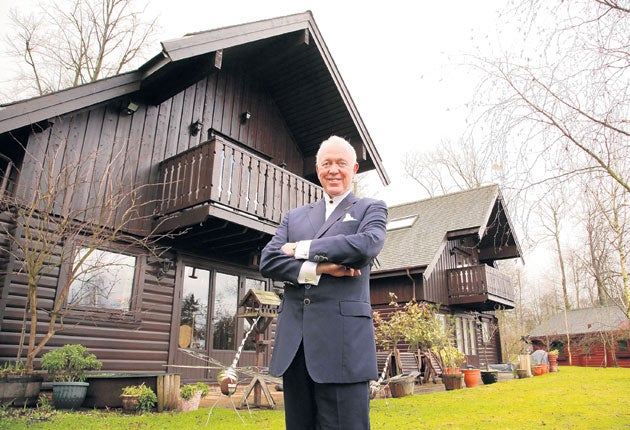Top school hires 'mind gurus' to teach its pupils how to think
Wellington College wants to free children from rote learning by enabling them to work things out

Your support helps us to tell the story
From reproductive rights to climate change to Big Tech, The Independent is on the ground when the story is developing. Whether it's investigating the financials of Elon Musk's pro-Trump PAC or producing our latest documentary, 'The A Word', which shines a light on the American women fighting for reproductive rights, we know how important it is to parse out the facts from the messaging.
At such a critical moment in US history, we need reporters on the ground. Your donation allows us to keep sending journalists to speak to both sides of the story.
The Independent is trusted by Americans across the entire political spectrum. And unlike many other quality news outlets, we choose not to lock Americans out of our reporting and analysis with paywalls. We believe quality journalism should be available to everyone, paid for by those who can afford it.
Your support makes all the difference.That famous Dickensian traditionalist teacher Thomas Gradgrind would be turning in his grave.
Wellington College, one of the country's top independent schools, has decided the time has come to teach its pupils how to think.
To that end, it has employed a thinker-in-residence – writer and broadcaster Tony Buzan.
It will be Mr Buzan's task to deliver lessons that introduce pupils at the school to new and effective ways of thinking.
He will be aided by Julian Baggini, the author and philosopher, who has been appointed to a second key role aimed at promoting argument and discussion in the classroom – philosopher-in-residence.
Anthony Seldon, the school's headmaster, believes the two roles are essential because today's pupils are losing out under the relentless test and exams-conscious curriculum they have to study.
"We have lost sight of what education is about in Britain," Dr Seldon said. "We have allowed ourselves to believe it is all about exams and testing, for which pupils absorb facts, and rote learning, and schools and teachers are valued wholly by their exam scores.
"Education is about much more than this. It is about teaching the whole child and this involves being taught how to think and reason independently.
"This is a basic right of each child and without it, no student of 18 can be said to be fully educated."
Mr Buzan and Dr Baggini's roles, though, will not be confined to the pupils. The school believes it will also be essential to train teachers, support staff, parents and governors in the art of thinking. Mr Buzan will be in the school every week to deliver seminars and lessons.
Topics will include how to think logically, how to recognise the difference between inductive and deductive reasoning and how to construct and probe weaknesses in arguments and received wisdom.
He has already written 82 books on the brain, learning and thinking skills – which have been published in over 100 countries and translated into 30 languages. He has also hosted a long-running series on BBC television. He will use his time at the school to co-author another book, The Thinking School , and produce another TV programme which will focus on the school and its pupils and teachers.
He said he felt the scheme would "raise the profile of creativity in the curriculum and expand the concept of thinking".
Dr Baggini will spend around 10 days a year at the school, helping pupils and staff to understand the basic philosophies of knowledge, politics, morality and religion.
"My aim is not only to get the students thinking but to get them thinking about their thinking," he said. "In a culture of blogs and constant appeals in the media for people to text or email with their thoughts, people need little encouragement to have opinions.
"However, I do think there is a need to increase understanding of what would justify these opinions."
Both will be paid an honorarium for their work with the school.
The scheme has been welcomed by Sir Michael Barber, the former Downing Street education adviser under Tony Blair, who said: "Children and young people need to learn to think inductively and deductively, alone and in teams, logically and creatively, spontaneously and deeply."
The initiative comes at a time when many in the education world are questioning whether today's education system has gone too far in the direction of the kind of Gradgrind philosophy so caricatured by Dickens. There are complaints from the private sector that GCSE exams do not stretch pupils enough and from state school teachers that too much reliance on testing in the primary school sector has left pupils without a broad and balanced curriculum.
"Education in this country has become too much about telling pupils the facts then remembering these facts and regurgitating them in tests and exams," said Dr Seldon.
"In history, for instance, under the current regime, teachers tend to tell pupils what happens at, say, the Battle of the Somme: but it is much better to tell them how both sides had prepared and then allow them to think through for themselves what might have happened.
"We have to put discovery back at the heart of education. When a child works out something for him or herself, it will always be their own: when a teacher tells them, it will always remain someone else's knowledge. Thinking has to be active not passive."
The two new appointees will take up their in-residence posts this September.
Join our commenting forum
Join thought-provoking conversations, follow other Independent readers and see their replies
Comments